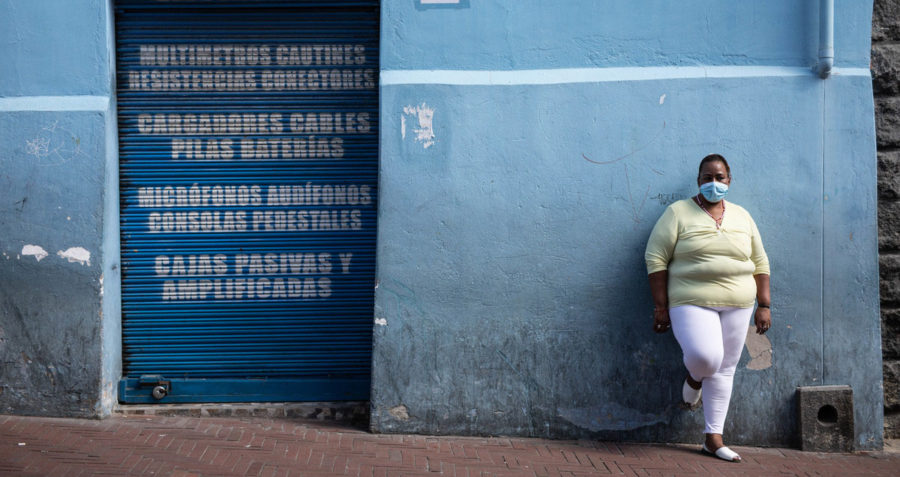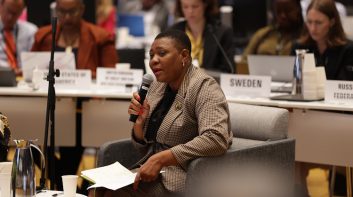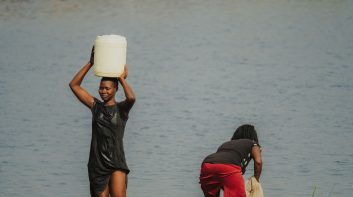Pandemic perspectives on sex and survival in the city
 © Frontline AIDS/Keoma Zec 2020
© Frontline AIDS/Keoma Zec 2020
In Ecuador, COVID-19 has devastated lives and livelihoods but sex workers have been excluded from government support.
In 2020, the South American country suffered one of the worst COVID-19 outbreaks in the world, and the crisis there is far from over. In April 2021, the government imposed a new month-long curfew and other movement restrictions as a spike in cases again overwhelmed hospitals.
During the first wave, sex workers – who in Ecuador are mainly cis and trans women – initially complied with lockdown restrictions but have since returned to work to survive, risking COVID-19, state sanctions and further social stigma in the process.
Sex work and HIV
The impact on people living with HIV has also been significant, mainly due to treatment disruptions. And because of their increased vulnerability to HIV, it is sex workers, trans women, and men who have sex with men who are most likely to be at risk.
“HIV affected me a lot personally,” says Celia, a sex worker in Quito. “It is a really difficult disease. COVID-19 has also affected me greatly as I was really afraid of getting it. There is almost no work either – I get one, sometimes two or three clients a day, no more.”
Frontline AIDS partner Kimirina has been instrumental in ensuring marginalised communities in Ecuador are not forgotten during the pandemic. The organisation, which has staff members from the sex work community in its ranks, has been providing people who sell sex with COVID-19 tests alongside tests for HIV and other sexually transmitted diseases. Kimirina also supplies emergency food parcels for any sex worker who tests positive for COVID-19. And it is keeping community HIV services running via an innovative ‘telemedicine’ system, which supplies HIV treatment refills and pre-exposure prophylaxis for HIV prevention (PrEP) without the need for a face-to-face consultation.
A forgotten community
In the early days of the pandemic one of the main difficulties was ensuring marginalised communities, especially people living with HIV, understood the risks COVID-19 posed.
“I had many arguments with my colleagues who didn’t want to stop working because of the pandemic and I ended up being seen as a bad leader in their eyes,” says Maria Jose, who runs a local sex worker organisation in Quito and also coordinates activities with Kimirina. “They didn’t understand the gravity of the situation.”
“To provide support to sex workers during the pandemic has been very challenging, but there is a great need,” adds Jimmy Medina, Kimirina’s project coordinator. “Most of the people we’ve assisted told us they had received no help from the government in terms of social protection because sex workers are not considered eligible.
While sex work is not illegal in Ecuador, sex workers still face stigma and harassment from police, and their work is often not recognised. During the lockdowns, sex workers income diminished because of curfews and brothel closures.
Jimmy continues: These circumstances are also increasing sex workers’ vulnerability. Potential clients are able to negotiate unsafe conditions [such as condomless sex] and they are taking advantage of the opportunity to reduce the price they pay. This is increasing the risk not only of COVID-19 transmission but of HIV and STIs.”
The emotional toll of the pandemic
Kimirina is mindful of the emotional toll the pandemic is having on the lives of many of the marginalised people it supports, and has introduced a mental health programme, which includes online coaching and yoga, and a weekly virtual get together. For many, this has been a lifeline.
“Before the Kimirina sessions I never did meditation and now I love it,” says Maria Jose. “It really helps me relax and control my own emotions, which is very much needed. Kimirina has been the support we needed during the pandemic as we weren’t receiving it from anywhere else.”
Fernanda Baguel, a sex worker in Guayaquil, agrees: “Kimirina has helped me in many ways throughout the years but more than anything now during the pandemic. Their food coupons definitely were a big help to myself and many other people around me.
“I am also very grateful for the check-ups and how they worry about us mentally, while nobody else really does, not even the government. They also provide us with things we can use for our job like lubricants, condoms, tests. As far as I know, they are the only ones helping us in the city and treating us with the respect we deserve.”
A great strength
As COVID-19 infections rise once more, exhausted Kimirina staff members are worried about what’s in store.
“For many sex workers, the possibility of accessing basic needs, such as food, paying rent, purchasing medicine, among others, is very low or non-existent, causing greater vulnerability to their rights,” says Jimmy. “Most of these people are heads of households and in some cases they are responsible for providing for other people, older adults or children, who are dependent on their income.”
But Jimmy says it is organisations like Maria Jose’s that will help the sex worker community continue to find a way through. “For a long time, groups and organisations of sex workers have seen the need to lead their own organisations and create support systems and mutual help among themselves, a characteristic that derives from having their needs neglected by wider society,” he says. “This is of great value. This strength is the thing that makes interventions work. As long as they have allies like Kimirina solutions will be found to meet their needs.”
Maria Jose adds: “To the sponsors of Kimirina’s programmes I would say, don’t stop the great work you are doing. In Ecuador, Kimirina is doing an incredible job, they are with us when no one else wants to be.”
Further Reading
Tags
ArgentinaHIV preventionHuman rightsSex workSexual and reproductive health and rights (SRHR)Stigma and discrimination




